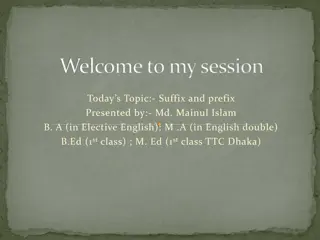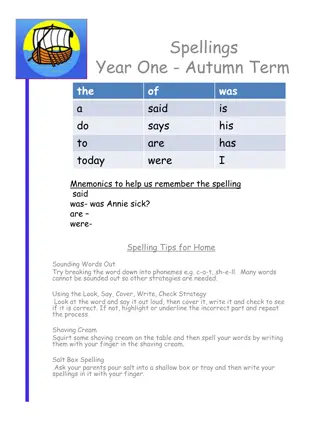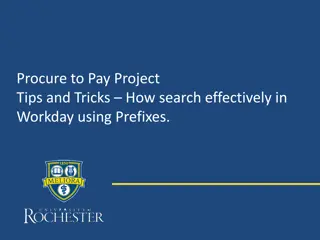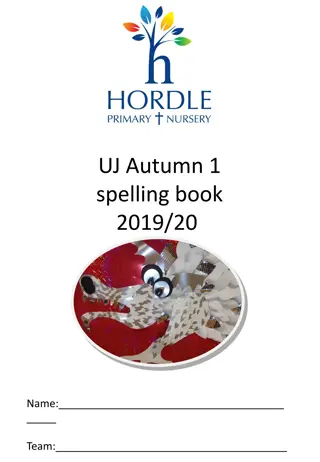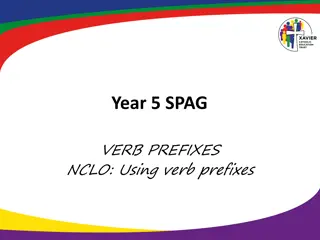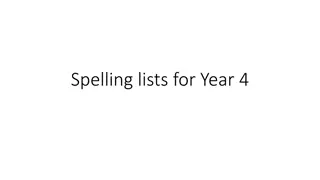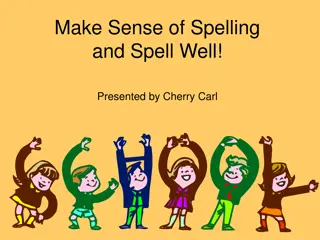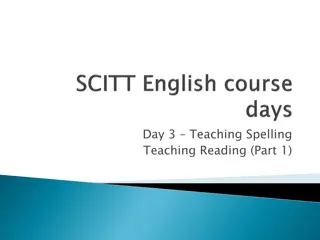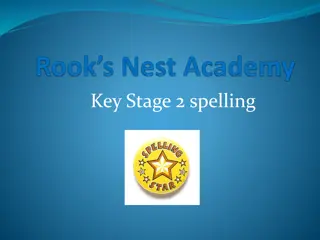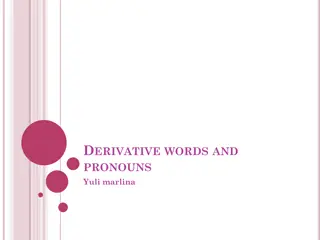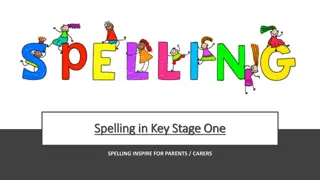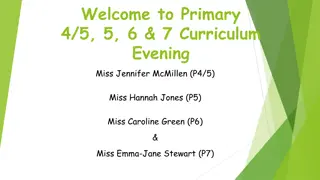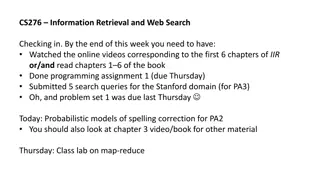English Spelling Rules and Prefixes Guide for Years 3 and 4
Improve your English spelling skills with this comprehensive guide for Years 3 and 4. Learn how to add suffixes to multi-syllable words, understand the various vowel sounds, and master common prefixes. Enhance your vocabulary and writing with examples and rules provided in an easy-to-follow format.
Download Presentation

Please find below an Image/Link to download the presentation.
The content on the website is provided AS IS for your information and personal use only. It may not be sold, licensed, or shared on other websites without obtaining consent from the author. Download presentation by click this link. If you encounter any issues during the download, it is possible that the publisher has removed the file from their server.
E N D
Presentation Transcript
ENGLISH APPENDIX 1 SPELLING Years 3 and 4
Adding suffixes beginning with vowel letters to words of more than one syllable Rules and Guidance Example Words If the last syllable of a word is stressed and ends with one consonant letter which has just one vowel letter before it, the final consonant letter is doubled before any ending beginning with a vowel letter is added. The consonant letter is not doubled if the syllable is unstressed. forgetting, forgotten, beginning, beginner, prefer, preferred gardening, gardener, limiting, limited, limitation 2
The short //sound spelt y elsewhere than at the end of words Rules and Guidance Example Words These words should be learnt as needed. myth, gym, Egypt, pyramid, mystery 3
The short /u/ u/ sound spelt ou Rules and Guidance Example Words These words should be learnt as needed. young, touch, double, trouble, country 4
Prefixes (Part 1) Example Words Rules and Guidance Most prefixes are added to the beginning of root words without any changes in spelling, but see in below. Like un , the prefixes dis and mis have negative meanings. The prefix in can mean both not and in / into . In the words given here it means not . Before a root word starting with l, in becomes il. dis : disappoint, disagree, disobey mis : misbehave, mislead, misspell (mis + spell) in : inactive, incorrect illegal, illegible 5
Prefixes (Part 2) Rules and Guidance Example Words Before a root word starting with m or p, in becomes im . Before a root word starting with r, in becomes ir . re means again or back . sub means under . immature, immortal, impossible, impatient, imperfect irregular, irrelevant, irresponsible re : redo, refresh, return, reappear, redecorate sub : subdivide, subheading, submarine, submerge inter : interact, intercity, international, interrelated (inter + related) inter means between or among . 6
Prefixes (Part 3) Example Words Rules and Guidance super means above super : supermarket, superman, superstar anti : antiseptic, anticlockwise, antisocial anti means against . auto means self or own . auto : autobiography, autograph 7
The suffix ation Rules and Guidance Example Words The suffix ation is added to verbs to form nouns. The rules already learnt still apply. information, adoration, sensation, preparation, admiration 8
The suffix ly (Part 1) Example Words Rules and Guidance The suffix ly is added to an adjective to form an adverb. The rules already learnt still apply. The suffix ly starts with a consonant letter, so it is added straight on to most root words. If the root word ends in y with a consonant letter before it, the y is changed to i, but only if the root word has more than one syllable sadly, completely, usually (usual + ly), finally (final + ly), comically (comical + ly) happily, angrily 9
The suffix ly (Part 2) Rules and Guidance Example Words If the root word ends with le, the le is changed to ly If the root word ends with ic, ally is added rather than just ly, except in the word publicly. The words truly, duly, wholly gently, simply, humbly, nobly frantically, dramatically 10
Words with endings sounding like /sher/ or /cher/ Rules and Guidance Example Words The ending sounding like /sher/ is always spelt sure. The ending sounding like /cher/ is often spelt ture, but check that the word is not a root word ending in (t)ch with an er ending e.g. teacher, catcher, richer, stretcher. measure, treasure, pleasure, enclosure creature, furniture, picture, nature, adventure 11
Endings which sound like /shun/ spelt sion Rules and Guidance Example Words If the ending sounds like /shun/, it is often spelt as sion. division, invasion, confusion, decision, collision, television 12
Endings which sound like /shun/, spelt sion, cian Rules and Guidance Example Words sion is used if the root word ends in d or se. Exceptions: attend attention, intend intention. cian is used if the root word ends in c or cs. expansion, extension, comprehension, tension musician, electrician, magician, politician, mathematician 13
Endings which sound like /shun/, spelt tion, ssion Rules and Guidance Example Words tion is used if the root word ends in t or te. ssion is used if the root word ends in ss or mit. invention, injection, action, hesitation, completion expression, discussion, confession, permission, admission 14
The suffix ous Example Words Rules and Guidance Sometimes the root word is obvious and the usual rules apply for adding suffixes beginning with vowel letters. Sometimes there is no obvious root word. poisonous, dangerous, mountainous, famous, various tremendous, enormous, jealous humorous, glamorous, vigorous our is changed to or before ous is added. courageous, outrageous A final e of the root word must be kept if the short /j/ sound of g is to be kept. If there is a long /e/ sound before the ous ending, it is usually spelt as i, but a few words have e. serious, obvious, curious, hideous, spontaneous, courteous 15
Words with the short /k/ sound spelt ch (Greek in origin) Rules and Guidance Example Words No specific guidance scheme, chorus, chemist, echo, character 16
Words with the /sh/ sound spelt ch (mostly French in origin) Rules and Guidance Example Words chef, chalet, machine, brochure No specific guidance 17
Words ending with the short /g/ sound spelt gue and the short /k/ sound spelt que (French in origin) Rules and Guidance Example Words No specific guidance league, tongue, antique, unique 18
Words with the short /s/ sound spelt sc (Latin in origin) Rules and Guidance Example Words No specific guidance science, scene, discipline, fascinate, crescent 19
Words with the /ay/ sound spelt ei, eigh, or ey Rules and Guidance Example Words No specific guidance vein, weigh, eight, neighbour, they, obey 20
Possessive apostrophe with plural words Rules and Guidance Example Words The apostrophe is placed after the plural form of the word; s is not added if the plural already ends in s, but is added if the plural does not end in s (i.e. is an irregular plural e.g. children s). girls , boys , babies , children s, men s, mice s (Note: singular proper nouns ending in an s use the s suffix e.g. Cyprus s population) 21
Homophones and near-homophones Example Words Rules and Guidance No specific guidance accept/except, affect/effect, ball/bawl, berry/bury, brake/break, fair/fare, grate/great, groan/grown, here/hear, heel/heal/he ll, knot/not, mail/male, main/mane, meat/meet, medal/meddle, missed/mist, peace/piece, plain/plane, rain/rein/reign, scene/seen, weather/whether, whose/who s 22


